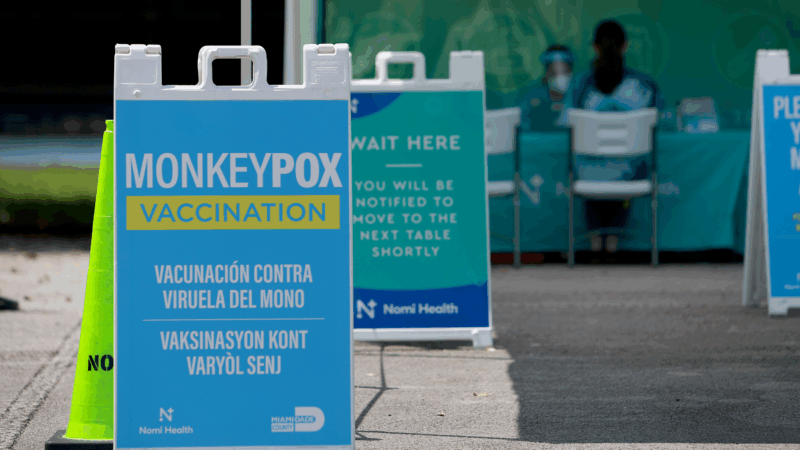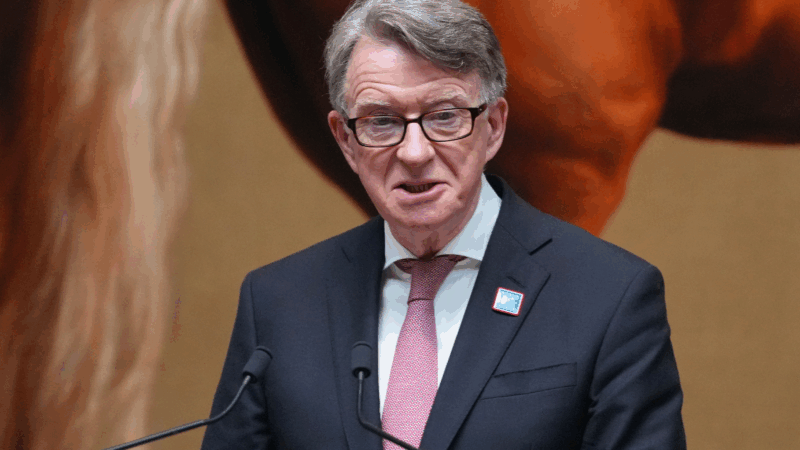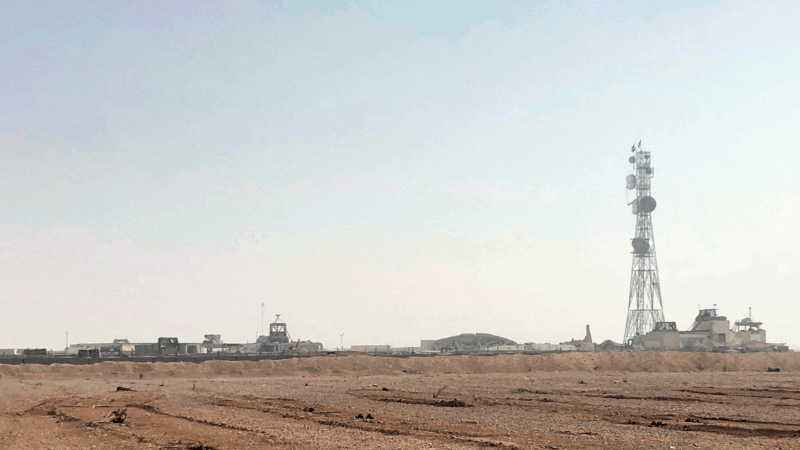In 2022, the name ‘monkeypox’ was nixed. Now the U.S. is reviving it
In 2022, the medical establishment and public health world nixed the name “monkeypox” for two key reasons. Animal-to-human transmission comes from rodents. And the name “monkeypox” was seen as racist and stigmatizing language.
To replace it, World Health Organization (WHO) officials decided to call the disease that causes painful lesions “mpox.”
Now, the U.S. is reverting to the old term “monkeypox.”
“The first question is: ‘Why?’ It doesn’t make any sense,” says Dr. Joseph Cherabie, an assistant professor of infectious diseases at Washington University in St Louis. He cares for mpox patients and, back in 2022, pushed for the term “monkeypox” to be retired.
Dr. Boghuma Titanji echoed that sentiment. “This reversion is just very baffling to me,” she says. “No one in the research community is clamoring for this. No one in the public health community is clamoring for this.” Titanji is an infectious disease physician and mpox researcher at Emory University.
In response to an email from NPR asking about a change in the terminology, the U.S. Health and Human Services (HHS) sent this statement: “Monkeypox is the name of the viral disease caused by the monkeypox virus.”
“That would be inaccurate,” says Dr. Daniel Bausch, a professor at the Geneva Graduate Institute and infectious disease expert. “They either are misinformed and they’re not aware that it’s switched to mpox, or they are not willing to accept the recommendations from [World Health Organization] and the committee that assigns disease names.”
In 2022, the U.S. Centers for Disease Control and Prevention adopted the WHO’s change to mpox. The HHS spokesperson did not respond to requests for clarification about why HHS was using the old term or when it started doing that. The change goes back to at least Aug. 28, 2025 when the State Department used the term “monkeypox” in an email to NPR.
While there’s no official announcement — or explanation — from the U.S. about the switch, mpox experts have guesses — and, they say, this is part of a much longer history of debating what to call diseases.
Why was it called “monkeypox” in the first place?
The virus was first discovered in 1958 in Denmark in a group of monkeys that were kept in a lab for research. That’s how the term monkey was attached to the virus.
When the first human case of mpox was discovered in 1970 in the Democratic Republic of the Congo, researchers tried to figure out if the young boy who was sick had any contact with monkeys. It wasn’t until later that they realized the virus was, in fact, not jumping from monkeys to humans. Instead, they know believe that the virus comes from contact with small mammals and rodents in the forest in central and west Africa, like squirrels that are hunted for food. It then spreads between humans through close contact and sexual contact.
But the name monkeypox stuck until 2022 when the virus took off globally. According to WHO, it spread suddenly and rapidly to over 100 countries and primarily impacted gay men.
It was at that point that there was a concerted push to change the name. Titanji understands firsthand why.
Why the name change?
In 2022 as the outbreak was unfolding and spreading, Titanji would post the latest medical information on her Twitter account, now called X.
She was shocked by the messages she started receiving.
“Because I am a black woman, the name monkeypox was co-opted to direct vitriol toward me,” Titanji remembers. “Some of the [messages] were likening me to a monkey, [some were] asking me to go back to Africa where the disease comes from and where people have sex with monkeys, and [some messages were about me] being someone who defends gay sex with monkeys. Those were some of the really, really dark direct messages that I got in my inbox during that time.”
The term “monkey” has a long history of being used as a racist and dehumanizing slur against Black people. Cherabie says the name also played into problematic narratives that associate the LGBTQ community with bestiality since the name prompted false assumptions that people got the virus by having sex with monkeys.
In 2022, patients, health care workers and others urged the WHO to rename the disease. During that summer, New York City’s then Health Commissioner Dr. Ashwin Vasa sent a letter to WHO asking them to quickly rename monkeypox, citing “potentially devastating and stigmatizing effects.”
In November of that year, WHO announced the new name for the diseases and a transition period of one year. (While WHO names diseases, the underlying virus is named by the International Committee on Taxonomy of Viruses and has not changed from orthopoxvirus monkeypox. Bausch says part of the reason is for historical consistency in medical research terminology.)
Titanji says the change was welcomed by patients and the scientific community. “It shifted the focus from what I would call a distraction — in terms of an easy name to troll — and really brought the focus to the problem at hand,” she says.
This is far from the first time a disease name has raised concerns about stigmatizing groups of people or geographic areas. In February of 2020, WHO gave COVID-19 a name, replacing the informal name many had adopted based on the city where it first emerged in China: “Wuhan virus.”
Why did the U.S. revert to “monkeypox”?
While the Health and Human Services did not provide an explanation for the shift, Cherabie, the Washington University professor, says it feels like it fits into a pattern. “It just falls in line with the playbook of this administration to go back to controversial terms,” he says. “This is a simple provocation.”
This is not the only case of a potentially problematic designation. WHO guidelines from 2015 discourage disease names that refer to specific places, people and professions, to avoid stigmatizing them. However, these guidelines are not followed in all cases. Some diseases — such as Middle East respiratory syndrome or MERS — continue to be named after places and people.
“There are many, many viruses and diseases that really were given the wrong name,” says Bausch, who is also a visiting professor at the National University of Singapore. “We’d have to change Ebola and Sudan virus and Marburg virus [which are named after a river, country and city] and lots of other things, but I don’t think there’s a huge appetite for doing that because of the confusion that it would create.”
However, he warned that if the U.S. is indeed reverting to the term “monkeypox” after a successful global transition to mpox that itself could create confusion.
“[It must be] more of a political motivation for this to be happening,” Bausch says, “If there’s a significant body of people who feel offended by something, you know, why not listen to them?”
His sense is that the Trump administration might have considered the original name change “a woke thing” and that it might be part of the Trump administration’s tense relationship with the World Health Organization. Trump announced he’d be pulling the U.S. out of WHO on inauguration night.
Asked about the U.S. return to the term “monkeypox,” with its implications, the media team for WHO did not address the change but referred NPR to articles on the original name change in 2022 and their 2015 guidelines of naming diseases.
For her part, Titanji says she’ll be sticking with the term mpox.
Epstein files fallout takes down elite figures in Europe, while U.S. reckoning is muted
Unlike in Europe, officials in the U.S. with ties to Epstein have largely held their positions of power.
Four people on NASA’S Crew-12 arrive at the International Space Station
The crew will spend the next eight months conducting experiments to prepare for human exploration beyond Earth's orbit.
American speedskater Jordan Stolz wins second Olympic gold with 500-meter race victory
With the win, Stolz joins Eric Heiden as the only skaters to take gold in both the 500 and 1,000 at the same Olympics.
US military reports a series of airstrikes against Islamic State targets in Syria
The U.S. military says the strikes were carried out in retaliation of the December ambush that killed two U.S. soldiers and one American civilian interpreter.
5 European nations say Alexei Navalny was poisoned and blame the Kremlin
In a joint statement, the foreign ministries of the U.K., France, Germany, Sweden and the Netherlands say Navalny was poisoned by Russia with a lethal toxin derived from the skin of poison dart frogs.
It’s a dangerous complication of pregnancy — but a new drug holds promise
Researchers celebrate early results of a drug that may become the first treatment for a serious complication of pregnancy called preeclampsia. It's got the potential to save many lives.







